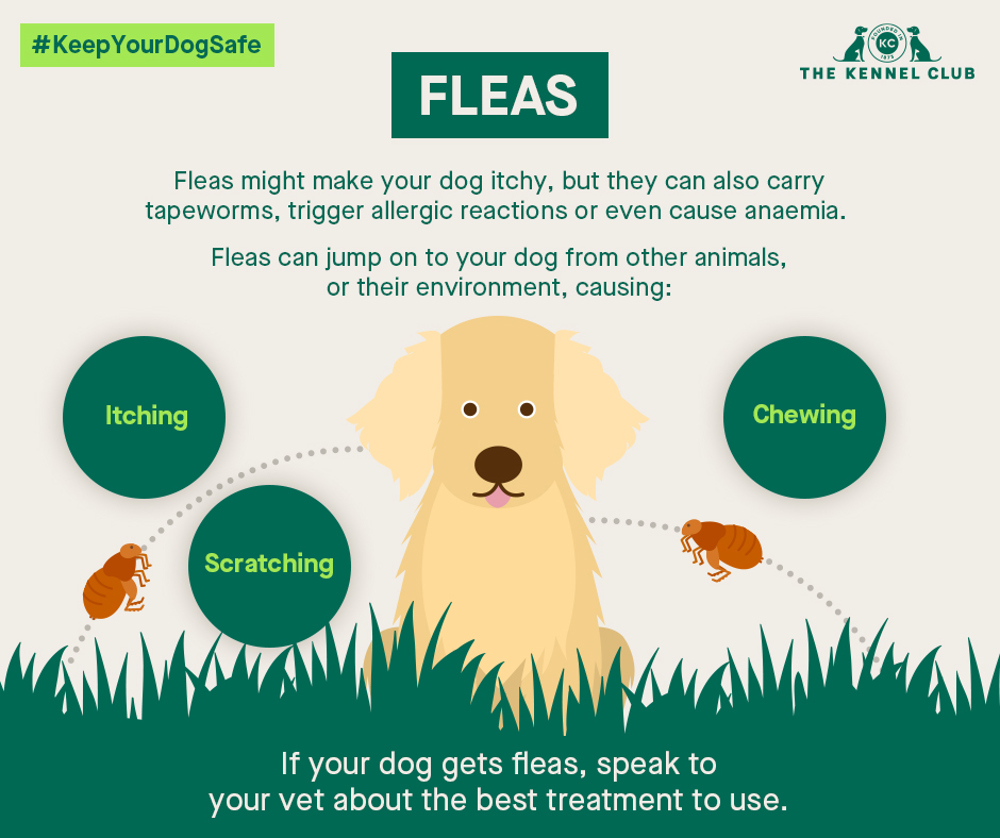
Why do dogs get fleas?
Dogs and cats are often infested with fleas through contact with other animals or contact with fleas in the environment. The strong back legs of this insect enable it to jump from host to host or from the environment onto the host.
What is a flea's life cycle?
- An adult flea can lay hundreds of eggs in a matter of days
- Flea eggs fall off pets onto carpet, bedding into floorboards and onto soil
- After hatching, larvae eat the faeces of adult fleas and other organic debris before spinning a cocoon and pupating
- The pupa can stay in the cocoon for up to a year, waiting for the right conditions to emerge
How quickly can an infestation occur?
It is important to kill fleas quickly before their life cycle from an egg to an adult flea can be completed and an infestation develops. The flea life cycle can take as little as 12 to 14 days or as long as 180 days. Under typical household conditions, a complete life cycle usually takes three to six weeks.
What are the signs your dog has fleas?
The first sign of fleas for many pet owners is:
- your dog itching, scratching or chewing at themselves, leading to hair loss and red or irritated skin
- visible fleas or flea dirt (flea faeces) on your dog
Although many dogs are very itchy and uncomfortable, some dogs may show no signs at all and fleas can be difficult to see.
What harm can fleas cause?
Fleas can cause serious disease in cats and dogs, such as flea allergy dermatitis (FAD) and even anaemia. Fleas can also carry tapeworm larvae, which can infect your pet if they accidentally ingest fleas while they are grooming themselves.
What should I do if my dog has fleas?
Find a suitable flea treatment for your dog and any other pets in your house. Many products kill adult fleas on the pet as well as larvae in the home and if you have an infestation of fleas living in your carpets, ensuring you treat the environment is also essential.
What flea treatments are available?
There are a number of flea treatments available and many treat a number of other parasites too. Different products also have different lengths of intervals between treatments, so it is important to ensure you follow the manufacturer’s guidelines and seek guidance from your vet.
How often should I treat my dog for fleas?
This will vary from product to product and it is important that you read the product guidelines.
How do I treat my home for fleas?
Fleas can survive without a host for many months so take the following steps to minimise the risk of fleas returning:
- Clean bedding regularly
- Vacuum furniture, floors and skirting boards
- Throw away the dust bag from your vacuum after each use
- Regularly use an effective ectoparasitide to prevent re-infestation
How can I prevent fleas?
- Fleas and ticks are external parasites that can cause extreme discomfort and serious illness in pets and even people
- Fleas and ticks are easily prevented from bothering your pet with products that are safe, easy to administer and effective
- Parasite prevention also may require treating your home and keeping pets out of areas where fleas and/or ticks are likely to lurk
- Flea or tick control products meant for dogs should never be used on cats and vice versa
What can I do when fleas keep coming back?
Due to the flea life cycle, new fleas may carry on emerging in the home for six weeks or longer after initial application of an effective flea treatment to your pet; therefore more than one treatment may be required. It is also recommended that all cats, dogs and rabbits in the household be treated. Suitable environmental measures are also recommended. Regular use of an effective flea product will prevent re-infestation. If you are still receiving problems having treated your home environment too, maybe you need to call out a local pest controller to treat your home.
Article author
This article was written by Luke Gamble, CEO of Worldwide Veterinary Service and Mission Rabies and star of Sky One's Vet Adventures who has given The Kennel Club kind permission to replicate this article.
Think your dog may be affected?
If you're worried about your dog's health, always contact your vet immediately!
We're not a veterinary organisation and so we can't give veterinary advice, but if you're worried about any of the issues raised in this article, please contact your local vet practice for further information.
Find a vet near you
If you're looking for a vet practice near you, why not visit the Royal College of Veterinary Surgeons' Find a vet page.
